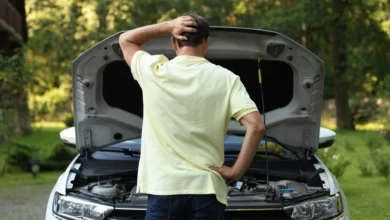
You’re cruising down the road, and suddenly, your check engine light flashes on. Panic sets in—what could it mean? Is it something minor, or are you headed for an expensive repair? Ignoring these early signs often leads to bigger problems and costly fixes. Unfortunately, many car owners don’t know what to look for or how to prevent these issues before they escalate.
But the truth is, most engine problems can be avoided with a bit of knowledge and regular care. This guide will help you recognize key engine issues, their symptoms, and the steps you can take to avoid breakdowns and keep your engine running smoothly.
1. Check Engine Light / Car Engine Problem Symbol
The check engine light is one of the most common and frustrating dashboard warnings. It doesn’t give you specifics, just a general warning that something isn’t right under the hood. While it could signal something minor like a loose gas cap, it could also indicate more serious engine issues that need immediate attention.
Symptoms to Watch For:
- A steady or blinking check engine light
- Unusual engine behavior, such as rough idling or stalling
- Reduced fuel efficiency or acceleration
- Other warning lights like the oil or temperature gauge lighting up
Causes of the Check Engine Light:
The check engine light can come on for a wide range of reasons, including:
- Loose gas cap: One of the simplest causes. The gas cap seals the fuel system and prevents fumes from escaping. If it’s loose or damaged, it could trigger the light.
- Faulty oxygen sensor: This sensor monitors the air-fuel mixture in the engine. A faulty one can cause poor fuel economy and engine performance.
- Catalytic converter issues: If your catalytic converter is failing, it may trigger the light and affect your vehicle’s emissions.
- Spark plug or ignition coil failure: These components are essential for proper engine combustion. If they fail, the engine will misfire, potentially causing long-term damage.
Prevention Tips:
- Regular maintenance: Keep up with your car’s scheduled maintenance, especially oil changes and spark plug replacements.
- Check gas cap: Always make sure your gas cap is tightly closed after refueling. A loose cap is one of the easiest and most common causes of the check engine light.
- Use a diagnostic tool: A simple OBD-II scanner can help you identify the problem quickly before you go to the mechanic. This tool reads the code your car’s computer is throwing and can help you determine the severity of the issue.
2. Overheating
An overheating engine is one of the most serious problems you can face on the road. If not dealt with immediately, it can lead to severe engine damage, including a cracked engine block or a blown head gasket.
Symptoms to Watch For:
- Temperature gauge rising into the red zone
- Steam or smoke coming from under the hood
- Unusual smell, like burning rubber or oil
Common Causes:
- Low coolant level: Your engine relies on coolant to keep it cool. If there’s a leak or the levels are too low, your engine can overheat.
- Faulty radiator: A clogged or leaking radiator prevents proper heat dissipation.
- Broken thermostat: The thermostat regulates the engine’s temperature. If it fails, it may not open to allow coolant to flow properly.
Prevention Tips:
- Check coolant levels regularly: Top off your coolant as needed, and make sure the system is free of leaks.
- Inspect the radiator: Keep the radiator clean and free of debris that could block airflow.
- Monitor the thermostat: Replace a faulty thermostat as soon as possible to avoid overheating.
3. Engine Knocking
Engine knocking refers to a metallic pinging or knocking sound coming from the engine, typically caused by improper combustion. This is often a sign of a more serious underlying issue that could damage engine components if ignored.
Symptoms to Watch For:
- Pinging or knocking sounds, especially during acceleration
- Decreased performance or sluggish acceleration
- Rough idling or misfiring
Common Causes:
- Low-quality fuel: Using low-octane or poor-quality fuel can cause premature detonation, leading to knocking.
- Carbon buildup: Carbon deposits on the engine’s cylinders can interfere with combustion.
- Faulty spark plugs: Worn or incorrect spark plugs can lead to incomplete combustion, causing knocking.
Prevention Tips:
- Use the right fuel: Always use the recommended fuel grade for your vehicle to avoid pre-ignition.
- Clean the fuel system: Use fuel additives to keep the combustion chambers clean and prevent carbon buildup.
- Replace spark plugs: Follow your vehicle’s maintenance schedule and replace spark plugs as needed to ensure proper combustion.
You might also like: Comprehensive Vehicle Maintenance and Repair
4. Poor Fuel Economy
If your fuel efficiency is dropping, it’s often a sign that something is wrong with the engine’s air-fuel balance. Poor fuel economy can be caused by several factors, from simple fixes to more serious engine issues.
Symptoms to Watch For:
- Frequent trips to the gas station
- Reduced acceleration or engine performance
- Check engine light
Common Causes:
- Clogged air filter: A dirty air filter restricts airflow to the engine, making it work harder and consume more fuel.
- Faulty oxygen sensor: This sensor measures the air-fuel mixture in the engine. A failing sensor can cause the engine to run too rich, burning more fuel.
- Improper tire pressure: Underinflated tires increase rolling resistance, which can lower fuel economy.
Prevention Tips:
- Change the air filter regularly: Keep your engine breathing freely by replacing the air filter at the recommended intervals.
- Maintain tire pressure: Check your tire pressure often, and keep it at the manufacturer’s recommended levels.
- Fix engine sensors: Replace failing oxygen sensors to ensure the air-fuel mixture remains optimized.
5. Power Loss
A sudden loss of power while driving can be alarming. Engine power loss can indicate a range of issues, from minor problems to more severe engine failure.
Symptoms to Watch For:
- Sluggish acceleration
- Difficulty maintaining speed
- Unresponsive throttle
Common Causes:
- Dirty fuel injectors: Clogged fuel injectors reduce the amount of fuel reaching the engine, causing poor performance.
- Faulty ignition system: Issues with the ignition system, such as worn-out spark plugs or ignition coils, can lead to misfires and reduced power.
- Blocked exhaust: A clogged catalytic converter or muffler can create backpressure in the exhaust system, limiting power output.
Prevention Tips:
- Clean fuel injectors: Use a fuel system cleaner to prevent buildup and clogs in the injectors.
- Maintain the ignition system: Regularly inspect and replace spark plugs and ignition coils to ensure proper combustion.
- Check the exhaust system: Keep the exhaust system free of obstructions by replacing worn-out components and ensuring the catalytic converter functions properly.
6. Engine Sputtering
Engine sputtering usually indicates a disruption in the combustion process, where the engine is not getting the correct air-fuel mixture. This can lead to poor performance and even cause the car to stall.
Symptoms to Watch For:
- Rough idle or stalling
- Hesitation during acceleration
- Popping or sputtering sounds from the engine
Common Causes:
- Dirty fuel filter: A clogged fuel filter restricts fuel flow to the engine, causing sputtering.
- Faulty mass airflow sensor (MAF): This sensor measures how much air is entering the engine. A failing sensor can lead to an incorrect air-fuel ratio.
- Vacuum leaks: A leak in the vacuum system can cause a disruption in the engine’s air intake, leading to sputtering.
Prevention Tips:
- Replace the fuel filter: Ensure the fuel filter is clean and replaced as part of regular maintenance.
- Inspect sensors: Regularly check and clean sensors like the MAF to avoid air-fuel imbalances.
- Fix vacuum leaks: Listen for hissing sounds from under the hood, which can indicate a vacuum leak, and get it repaired quickly.
Conclusion
Understanding car engine issues is crucial for any vehicle owner. Recognizing symptoms early—such as the check engine light, overheating, or engine knocking—can prevent minor problems from escalating into major repairs. By being proactive and following the prevention tips outlined in this guide, you can maintain your engine’s health and ensure a smoother driving experience. Regular maintenance and attention to detail not only keep your car running efficiently but also save you time and money in the long run. Stay informed, stay vigilant, and your vehicle will reward you with reliability and performance on the road.
We hope you found this article helpful. If you did, check out our blog for more great content like this.





